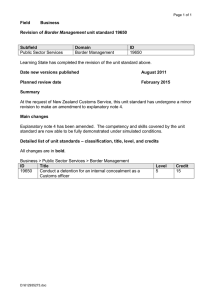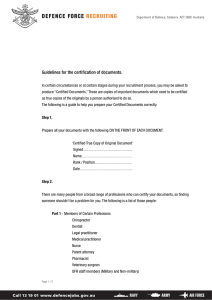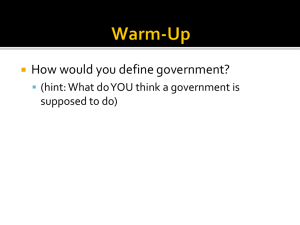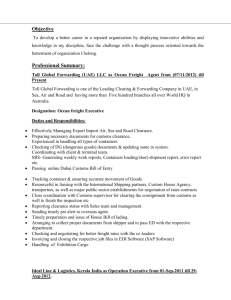guideline for completing the organisational suitability assessment
advertisement
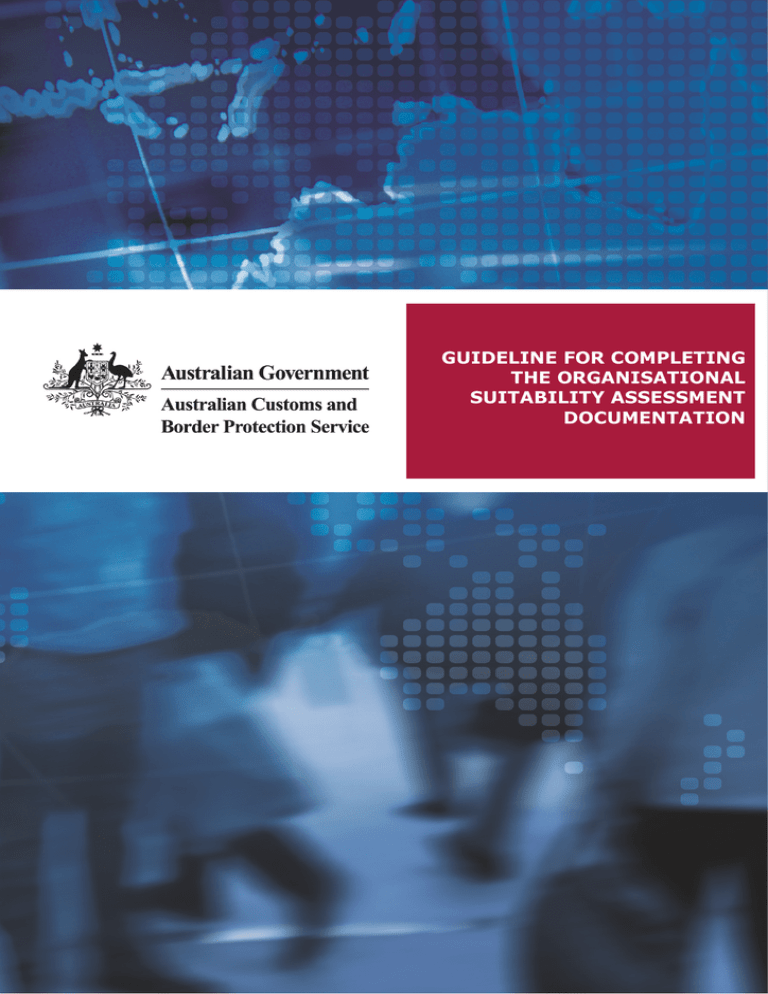
GUIDELINE FOR COMPLETING THE ORGANISATIONAL SUITABILITY ASSESSMENT DOCUMENTATION Introduction The Australian Government Security Vetting Agency The Australian Government Security Vetting Agency (AGSVA) is located within the Department of Defence and is the central agency for the processing, evaluating and granting of security clearances for the Commonwealth. The AGSVA conducts clearances for the majority of Government under a fee-forservice model. The Commonwealth Security Clearance process is conducted to ensure that an individual is both eligible and suitable to be granted, as well as maintain, a security clearance. A clearance is basically an inquiry into and corroboration of a person’s background, character and personal values. AGSVA will make the decision about granting a security clearance in accordance with the standards identified in the Australian Government Protective Security Policy Framework. The AGSVA security clearance process is separate to the Australian Customs and Border Protection Organisational Suitability Assessment process. Organisational Suitability Assessments Australian Customs and Border Protection Service (Customs and Border Protection) as a law enforcement agency has specific risks associated with corruption and infiltration, fraud and security as it relates to compromise of information, assets and reputation. Background, lifestyle and association factors can impact on the high level of integrity required for Customs and Border Protection, particularly as the organisation expands further into the national security sphere and law enforcement environments. Organisation Suitability Assessments (OSA) are checks undertaken separately to the minimum AGSVA security clearance standards, this is to ensure employees are suitable to work in Customs and Border Protection and access information in the law enforcement environment. OSAs are crucial to maintaining the integrity of Customs and Border Protection and protecting the agency from infiltration and corruption. OSA checks complement the security clearance process to determine a person’s suitability to access classified information. OSAs determine that an individual who holds the appropriate security clearance level is also suitable to work in the Customs and Border Protection environment. Customs and Border Protection’s approach to integrity assurance for employees is in accordance with Australian Government protective security policy and Australian Standards for Employment Screening. Remember The AGSVA Commonwealth Security Clearance and the OSA Employment Screening process are two separate activities. You will be required to submit similar documents for both processes. Documents You will receive your documents to start your Organisational Suitability Assessment process. These include: • • • • 100 Point Check - Proving your identity Form B248 - General Consent Form B251 - Consent to Obtain Personal Information, Full Exclusion Form B288 - Supplementary Questions These forms before being completed are not a classified document. Once you have completed these documents, they hold a dissemination limiting marker (these are markings for information where disclosure may be limited or prohibited by legislation, or where it may otherwise require special handling) of Sensitive: Personal. This means that any information contained within these may be used with security classified or unclassified information that is sensitive personal information. (This aligns with the definition of sensitive information in Section 6 of the Privacy Act.) Completing the documents It is important that you read all questions carefully before completing all documents. Please ensure that when completing the documents you print your information clearly. If you answer ‘yes’ to any of the questions then provide sufficient details to enable the assessment officer to understand the reason why you answered ‘yes’. This process it to determine your honesty, integrity, trustworthiness and suitability for employment with Customs and Border Protection so ensure your answers are to your best knowledge truthful and accurate. You are cautioned that the omission of relevant information and/or the provision of false and misleading information at any stage during the OSA process; whether due to intent, carelessness or reckless disregard on your part may raise doubt about your employment suitability and may result in a review of any Commonwealth Security Clearance that may have been granted to you previously. 100 Point Check- Proving your identity • • You are to supply one document listed under ‘Primary Document’ category and one document from the ‘Secondary Documents’ category. Each of the documents must be Certified True Copies, a list of people who can certify Identification Documents is provided at the end of this pack. Security Clearance held with another agency If you have a current Commonwealth Security Clearance, or have had a security clearance with another Government agency, then provide a copy of your clearance advice letter. Having a current Commonwealth Security Clearance at the required level or above means it may be able to be transferred to Customs and Border Protection. General Consent • • Nominate if you do/do not wish for your current employer to be contacted. You must also sign and date the form. Without a signature the OSA process cannot commence. Consent to Obtain Personal Information-Full Exclusion • Remember to sign and date the form on the first page. • ‘Other Names’ includes maiden names, names or abbreviations in which you have used before, if you have ever spelt your name differently (for example: Johnathon or Jonathon), or your nick name you may be referred to (for example Johnno). You may be requested for additional evidence if you have held a number of names. • • • Residential addresses are address where you have lived. You are to list details for the last 10 years without any gaps in the dates provided. Try to be as specific as possible, provide house/unit number, street name and title, suburb and post code for example Unit 3/116 Smith Street, Altona Meadows, Victoria 3206. If you cannot provide actual dates (20/07/1992 – 20/7/1993) then provide month and year (7/1992 – 7/1993). If specific or concurrent dates are not provided this may result in the assessment officer contacting you to provide documentation and prolong the assessment process. • List any traffic violation, criminal or traffic charges still pending before the court. Failure to be honest may raise doubt about your employment suitability and may result in a review of any Commonwealth Security Clearance that may have been granted to you previously. • Have you been convicted or found guilty of any offence. This includes speeding fines, red light camera offences, drink driving offences, any drug offences, any military offences, any matters relating to family court matters etc. • If you provide details ensure they are accurate and contain enough information for the assessment officer. Just nominating ‘speeding offences’ is not sufficient and will result in the assessment officer contacting you to provide further details and may delay the assessment process. Supplementary Questions It is very important you read and understand this entire document. It is also important if you answer ‘yes’ that you provide sufficient details to enable the assessment officer to understand the circumstances about the situation or events. You are able to attach additional paperwork to support your answers if required. • • • • • Assessments are based on an overall common sense determination based upon careful consideration of the whole of person. The following questions are not only about yourself, but your family, friends or even associates. Friends and associates aren’t just ‘people’ you have had recent dealing with, the questions is phrased as EVER. Family is to include close and estranged family. Cousins, extended family (in-law’s and stepsiblings/family), your spouses/partner’s family etc. Should you have any questions regarding this form you can contact the OSA team in Canberra by email on osa@customs.gov.au or the local Customs and Border Protection Regional Security Advisor or Recruitment officer. Full Name: ……………………………………………… Signature: ………………………………….. Email address: ………………………………………………………………………………………………. Date: ………………………………………………………………………………………………………….. • Ensure you sign and date this form and it is compulsory that you provide an email address (this is required for the AGSVA process to ensure a password can be sent to you). Remember It is important you provide accurate and truthful information at all stages in the OSA process. You should note that, first and foremost, this assessment is about you and that, as part of the OSA process, your honesty, integrity, trustworthiness and suitability for employment with Customs and Border Protection is being evaluated. Should you have any questions regarding this process or completing your forms you can email the OSA team on osa@customs.gov.au or the local Customs and Border Protection Regional Security Advisor or Recruitment officer. Certification of Personal Documents Please note, certification of documents must be in accordance with Commonwealth requirements A certified document is valid when the certifying officer notes that the document is a certified true copy of the original, they print their full name, provide their signature, write the date of certification and note their occupation (and length of service in any categories requiring a minimum service period) on the document. The document must be signed by someone from the approved category of persons as listed below: For Example: I certify that this document is an exact copy of the original document I have sighted. Signature: John Smith Name in full: John Mark Smith Occupation: Customs and Border Protection officer for 20 years Date: 1 May 2011 The following list of people can certify Identification Documents: • an individual who is employed and Registered as a nurse under the law of a State or Territory providing for that Registration; • a notary public; • a minister of religion who is registered as a marriage celebrant; • an individual registered or licensed as: 1. a dentist; 2. a medical practitioner; 3. a pharmacist; 4. a veterinary surgeon; under a law of a State or Territory for that registration or licensing; • a justice of the peace of a State or Territory; • a member of: 1. the Institute of Chartered Accountants in Australia; 2. the Australian Society of Certified Practising Accountants; 3. the National Institute of Accountants; • an officer within the meaning of the Defence Act 1903; • a member of the Federal Parliament or a State Parliament; • a legal practitioner of a Federal, State or Territory court; • a minister of religion who is registered as a marriage celebrant; • an individual employed as an officer or employee by one or more of the following: 1. the Commonwealth, a State or Territory 2. an authority of the Commonwealth, a State or Territory 3. a local government body of a State or Territory who has been so employed continuously for a period of at least 5 years, whether or not the individual was employed for part of that period as an officer and for part as an employee. • an individual employed as a full-time teacher or as a principal at one or more of the following educational institutions: 1. a primary or secondary school forming part of the education system in a State or Territory; or 2. an institution listed in Section 4 or paragraphs 34(4)(b)-(j) (inclusive) of the Higher Education Funding Act 1988; who has been so employed continuously for a 5 year period; • a member of the Australian Federal Police, or of the police force of a State or Territory, who in the normal course of his or her duties, is in charge of a police station; • a registrar, clerk, sheriff or bailiff; • a member of a municipal, city, town, district or shire council of a State or Territory; • an employee of a financial institution who is authorised by the financial institution to open accounts with the institution; • an agent of a financial institution who is authorised by the financial institution to open accounts with the institution; • a full-time employee of a company carrying on insurance business who has been employed continuously for at least 5 years by one or more companies of that type; • a full time employee of: 1. a financial institution; 2. a corporation that is a registered corporation within the meaning of the Financial Corporation Act 1974; who has been employed continuously for at least 5 years by one or more financial bodies; • an employee of a bank carrying on a business outside Australia: 1. that does not have an authority under Section 9 of the Banking Act 1959; and 2. that is engaged in a transaction with a cash dealer; who is authorised by the bank to open accounts with the bank; • an individual who is an agent of a totalisator agency board if the individual conducts an agency of the totalisator agency board at particular premises; and the agency is not ancillary to any other business conducted at those premises; • a fellow member of the National Tax and Accountants’ Association Limited; • a diplomatic or consular officer of an Australian Embassy, High Commission or Consulate, in Australia or overseas; • a holder of an office established by a law of the Commonwealth, a State or Territory in respect of which annual salary is payable; • a judge or master of a federal, State or Territory court; • a stipendiary magistrate of the Commonwealth or of a State or Territory; • a member of the Australian Federal Police, or of the police of a State or Territory, of or above the rank of sergeant; • a member of the Chartered Institute of Company Secretaries in Australia Limited; • a manager of a post office; • a commissioner for oaths of a State or Territory; • an individual who is registered as a tax agent under part VIIA of the Income Tax Assessment Act 1936; • a member or fellow of the Association of Taxation and Management Accountants; • a member of the Institution of Engineers Australia, other than a member with the grade of student; • an individual who, in relation to an Aboriginal community: 1. is recognised by the members of the community to be a community elder; or 2. if there is an elected Aboriginal council that represents the community – is an elected member of the council; • a member of the Legislative Assembly of the Australian Capital Territory, the Northern Territory or Norfolk Island. _______________________________________________________ Still have questions; Email: osa@customs.gov.au Mail your question to: OSA Assessment Team B1 Allara House, 48 Allara St, Canberra ACT 2600 Call or attend in person: Regional Security Advisor Recruitment Officer 1800 46 1245
